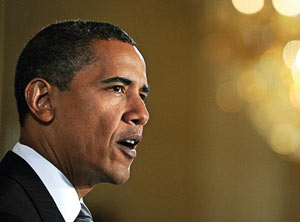Barack Obama’s plan for regulatory reform is not bold enough

FINANCIAL regulation in America has two problems: there is both too much of it and too little. Multiple federal agencies oversee the financial system: five for banks alone, and one each for securities, derivatives and the government-sponsored mortgage agencies. They share these duties with at least 50 state banking regulators and other state and federal consumer-protection agencies. Yet all these regulators failed to anticipate and prevent the worst financial crisis since the Depression, because risk-taking flourished in the cracks between them. Toxic subprime mortgages were peddled by lenders with little federal oversight and shoved into off-balance-sheet vehicles. The greatest leverage accumulated in firms that avoided the capital requirements of banks.
On June 17th Barack Obama took aim at these weaknesses (see article). His financial white paper gets much right. First, it does not pursue what Dan Tarullo, one of the governors of the Federal Reserve, has called “reform by nostalgia”. Rolling back the deregulation of the past three decades would have wiped out the genuine benefits that innovation and competition have brought to Americans. Second, it recognises that many remedies do not require new regulators, but simply better regulations, such as beefed-up capital and liquidity buffers for banks and shifting much of the “over the counter” trade in derivatives to regulated exchanges and clearing houses.
In other respects the plan does not go far enough. It does too little to reduce the multiplicity of regulators that has long undermined their effectiveness. To be sure, regulatory competition is not all bad: it can check government overreach and nourish experimentation. Nor is a unified regulator a cure-all: Britain’s Financial Services Authority failed to do anything about British banks’ excessive dependence on short-term, wholesale funding. But most of America’s overlap is a useless holdover from the days when commercial and investment banks, thrifts, government-sponsored enterprises and commodity dealers did different things. This overlap encourages dodgy firms to shop around for the friendliest regulator, which is how the Office of Thrift Supervision (OTS) ended up overseeing so many big, failed companies. It slows down implementation of new rules, breeds turf wars, corrodes accountability and increases costs.
But under the new proposals only one agency, the OTS, will disappear. A new agency to protect consumers will take this area over from the bank regulators. But it will not assume similar duties now held by the Securities and Exchange Commission or Commodity Futures Trading Commission, and have little enforcement authority over thousands of state-regulated finance companies and loan brokers—a glaring shortcoming given that such firms were responsible for originating a large share of toxic mortgages and abusive loans.
The plan also complicates the role of the Federal Reserve, which has already been exposed to political attack by its unprecedented interventions in markets and the economy. The Fed should certainly revisit how it does its job. The financial crisis has amply demonstrated that maintaining low inflation does not guarantee economic stability. This has fired up interest, in Europe as well as America, in “macroprudential regulation”: the notion that regulators must supplement “micro” supervision of individual firms by looking across entire markets and industries for risks that threaten the whole system.
This is much harder in practice than in theory. By its very nature, risk-taking thrives in the shadows and crises take regulators by surprise. But if macroprudential regulation is to be done, the central bank is the logical body to do it. As lenders of last resort central banks pick up the bill in systemic crises, so they deserve a role in preventing them. The European Union is also proposing that European central bankers work with bank supervisors to detect and prevent systemic risk. Unlike the EU proposals, however, Mr Obama’s plan also makes the Fed directly responsible for the supervision of all firms deemed too big to fail in addition to its existing responsibility for bank holding companies and some banks. That introduces conflicts of interest and risks of regulatory capture: might the Fed be tempted to bail out a firm to save jobs, for example, or refrain from raising interest rates to stop a big firm from failing? If the Fed is to receive this expanded macroprudential role, it should be stripped of its microprudential duties.
Don’t let a crisis go to waste
Mr Obama’s aides have concluded that a more ambitious overhaul of America’s sprawling regulatory system would expend too much political capital with too little benefit. That bodes poorly for their willingness to face down special interests over the details of even this limited proposal. Who will have to hold more capital, and how much? Which firms will be designated as systemically important, and how will they pay for their implicit government backing? How to prevent banks shopping around for laxer rules abroad? Mr Obama’s aides are famously fond of saying that crises create opportunities. But the best opportunity in years for a complete redesign of America’s regulatory apparatus seems to be going to waste.
